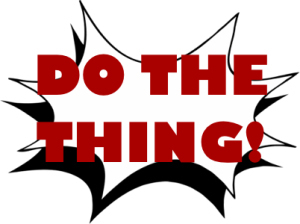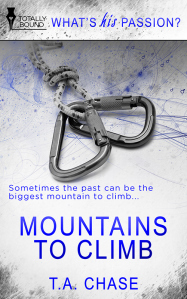Racheline Maltese's Blog, page 42
July 21, 2014
Doing the Thing! without support, permission, or approval
 Last night, I had what turned into a really cool conversation on Twitter that stemmed out of @WomenWriters asking about writers had support from their families.
Last night, I had what turned into a really cool conversation on Twitter that stemmed out of @WomenWriters asking about writers had support from their families.
My initial response was pretty harsh. Who needs support? Do men ask these questions about whether they have family support for their creative work? As women we have got to stop asking for permission.
But @WomenWriters was asking a value neutral question. Just a what is your situation like? and I jumped into this place of “Sometimes, as authors, and as female authors, we can internalize these questions in ways that are harmful to us and our work.” Which is true, but is a difficult nuance to get across on Twitter.
A long time ago, I dated a man with whom I had a lot of arguments about my writing, which at the time was mostly creative non-fiction, personal essay, and poetry (which is also work I still do). Some of this was because I wrote about him and our relationship to each other and our social community, which was complex and at times toxic. Some of this was just because my mode of public existence was so different from his.
I always told him I wanted his respect for my work. He would counter that it wasn’t fair of me to ask for his admiration. But by respect, I never meant admiration, more a benign sort of acceptance of its right to exist and my right to do it whatever he thought about it. I was asking for space and an acknowledgement of worth of the work to someone, if not to him.
While we were together, we never really came to a meeting of the minds on this issue. These many years later, we’re good, hard-won, and peculiar friends. The last time we saw each other, I actually spent a lot of time giving him my Do the Thing! speech. You can find 15 minutes a day to write your book if you want to do it enough. Fifteen minutes! It meant a lot to me to be able to say that to him and that he listened, although I don’t know if he’ll ever make the choices he’ll need to do write the book he wants to write. Because we’re close, I understand that (although it doesn’t mean I’m going to let him off the hook easily).
Choosing to write — or to follow any ambition — is hard. It’s personal. It’s scary. And it has repercussions we can anticipate and repercussions we can’t. In our own heads and in our relationships with others.
The most important thing I always want anyone to know about my writing career before they listen to anything resembling advice from me, is that there have been times (and by times I mean years) where I just stopped writing.
I didn’t write because I was afraid of disapproval. I didn’t write because I believed people when they told me no one would care about my stories or that no one would ever love me, fuck me, hire me, or talk to me again if I told my stories. I believed people when they said I didn’t have the right to speak. I believed them when they said that I simply created stories for attention and that attention was bad. I believed people when they said that my words were a moral harm.
None of those things were true, although let’s be honest: There have been times people have been hurt in response to my writing and in at least some of those cases the simple answer is that I fucked up.
So when the discussion out there is “Do your family and friends support your writing?” my first answer is always going to be Who cares? followed by a quick admonishment that you shouldn’t care either. Because — as we used to say back on The Well — you own your own words. You also own yourself.
This doesn’t mean don’t discuss your work with your family. This doesn’t mean don’t acknowledge or negotiate how your writing fits into or affects your relationships or other obligations. And it certainly doesn’t mean to be ungrateful if you do have support.
That my mother actually loved a musical about dominatrixes that I wrote the book for is one of the great achievements of my life. That my ex was proud of me for the essay I wrote about my misdeeds in the name of story in high school means something to me that I don’t care to articulate to anyone. And that my partner helps me with my novels as a first-reader even though they are not stylistically or in subject matter her first choice of reading material is an utter (very secular, because she has feelings about this) godsend.
But I value the support and encouragement I have because I have finally come to believe — after writing careers abandoned and more poor choices about myself and my words than it matters to describe — that permission and support just simply don’t matter.
I want you to have all of it in the world. But if you don’t, I don’t want you to let it stop you for a second. And I definitely want you to waste less time seeking it out from places you’re never going to get it from. You are beholden only to the integrity of your stories and to your integrity of self.
This doesn’t mean do whatever you want and damn the repercussions. But it does mean to stand up for your work and to fight for the space you need to create it.
Because when you realize you’re not doing anything wrong by having a story to tell, you will, among other things, be so much less likely to act the villain. You’ll treat yourself better; you’ll treat other people better; and you’ll probably get a lot more done too. For that it will be better, more honest work, even if it is fiction.
Need support? Or need a reminder that support can just go fuck right off? Either way, we’ve got you. Do the comments!


July 20, 2014
Story Process Sunday: The Philly Office
 We’ve mentioned, from time to time, our writing office in Philadelphia. We were there yesterday, where we realized we hadn’t actually told the story of how the Philadelphia office came to be.
We’ve mentioned, from time to time, our writing office in Philadelphia. We were there yesterday, where we realized we hadn’t actually told the story of how the Philadelphia office came to be.
Racheline lives in NYC, I’m in DC, and everything we write (unless we’re working on publisher edits) we do in Google Docs, so most of the time we can work just fine remotely. But when we had finished the first draft of Starling, we wanted to sit down in the same room and flip through a physical copy of the story in order to do an intense editing pass.
So we found an office in Philadelphia, which is halfway between our two cities, and had the first of what would become bimonthly trips to work actually face-to-face. We made a lot of jokes about our Secret Literary Affair, because we didn’t talk about Starling before it got accepted, so we were basically sneaking up to another city to work on our stuff for several months. (We’re still not sure if anyone actually thought we were having an affair – Racheline did once have an affair in Philadelphia, a few blocks from our current office, but years ago and not involving me!)
Having the office space, even just two days a month, is great. There aren’t any distractions (frankly, even though we usually work in a tiny side-office with a door we can close, we’re probably the most distracting things in the space, since we tend to forget how loud we’re talking when we’re breaking stories and trying to figure out where the sex goes. So uh, sorry, fellow office people.) There’s a whiteboard we can do brainstorming and visual story-mapping on. We can talk with our hands and convey the meanings and weird complex concepts to each other that we haven’t quite figured out the words for yet but [hand flap hand flap hand flap], you know?
There’s also something about being in a tiny room for an entire day, focused on a story or a world, that generates a kind of creativity we don’t really get elsewhere. And we are immensely creative over email and in google docs, but there’s something about Philadelphia that really is magic. Stories that we’ve struggled over putting the last pieces together in email for weeks, suddenly come together. Last night at dinner we had the brainwave that solved an entire novel outline we’d been stuck on.
Technology means we can do magic things while never being in the same space. But when we are in the same space, we can do magic we couldn’t do any other way.


July 15, 2014
Romance @ Random – True Blood Seasn 7, Episode 3 and 4 Recaps
I’ve been slightly remiss on posting links to my True Blood recaps over at Romance@Random.
The shining lights of the last two weeks of True Blood have been the Eric and Pam backstory about the birth of Fangtasia and the unresolved sexual tension between Lafayette and James.
Read all about episode 3 and episode 4 while the blood’s still warm. There’s major character death all over the place.


July 14, 2014
Do the Thing! – Fighting off distractions: No, not that kind; the other, crappier kind
 We all know that distractions are huge obstacles to getting done whatever it is we need or want to get done — whether that’s writing a book or doing the laundry. After all, I’m writing this and you’re reading this on the Internet.
We all know that distractions are huge obstacles to getting done whatever it is we need or want to get done — whether that’s writing a book or doing the laundry. After all, I’m writing this and you’re reading this on the Internet.
But when it comes to procrastination distractions, I can’t offer you a lot of help. It’s a demon I wrestle with because I love deadlines and eventually I get done what I need to do by the moment I need to do it. It’s stressful and weird and another challenge for another day.
Because there’s another type of distraction out there, the one that comes in the form of self-doubt and criticism. Now, it would be easy for me to just tell you that you are awesome and to get over that right now. I have before, and I will again. But let’s get real, sometimes we have long-standing worries and we need regular infusions of pep-talks and reassurances to get past them.
The problem is those aren’t always available to us. So, for me, labeling as a distraction self-doubt or negative obsession with stuff that isn’t really for me (i.e., reviews, which can be useful to me as a writer whether negative or positive, but are geared to the needs of readers), let’s me figure out a way to get past the problem quickly while I do the long-term work of self-confidence bit by slower bit.
Because a distraction, I can dismiss. I can say, it’s unimportant and not worth my time. I can give myself permission to indulge it or five minutes, take a walk to get it out of my system, and then I can declare it beneath my notice to get done what I need to get done.
Is this a solution that will bring you or me one step closer to healthy living? Maybe, maybe not. There’s certainly something to be said for at least sometimes deprioritizing self-hate, impostor syndrome, or just plain over-reacting to legitimate but not-for-you criticism, even when you should probably spend some time examining the origin of those feelings.
So while lots of time here we focus on a sort of Go Go Gadget Go that can be a little brutal, this one is sort of the opposite. This about handwaving and saying that doesn’t matter at all so you can get the work done versus chewing on your literal or virtual nails.
Got some stuff you want us to tell you to blow off? You know what to do. Got some tools to help with that other form of distraction, procrastination? Let’s face it, we probably need those too and they are more than welcome in the comments.


July 13, 2014
Story Process Sunday: Series Writing
 If you follow us on Twitter or tumblr, you’ve probably noticed our kvetching about our latest round of edits. Racheline and I have spent a large chunk of June, and a sizeable chunk of July, in editing various books in the Love in Los Angeles series. We’ll probably be spending August doing some as well. It’s hard work and it’s definitely not as fun or satisfying as plowing through the first draft of something, but it’s giving us some pretty interesting opportunities.
If you follow us on Twitter or tumblr, you’ve probably noticed our kvetching about our latest round of edits. Racheline and I have spent a large chunk of June, and a sizeable chunk of July, in editing various books in the Love in Los Angeles series. We’ll probably be spending August doing some as well. It’s hard work and it’s definitely not as fun or satisfying as plowing through the first draft of something, but it’s giving us some pretty interesting opportunities.
Racheline and I are both fast writers, and there are two of us, which means that we’re working on the third book (and beyond) in the Love in Los Angeles series while we’re doing publisher’s edits on the first book.
Also, as a rule, we write linearly/chronologically, but we brainstorm all over the damn place. While we were in the middle of writing Doves, for instance, we were sending emails back and forth about things that happen in the last book of the series. Sometimes, threads aren’t even about the books at all but the events that happen in between them that still have an impact down the road. (Some of those inter-book events, we plan to write up as short stories and post here on the blog as free bonus content, so keep an eye out for those!)
What that all means is that sometimes, the things that find happen in later books can inform and even change what happens or needs to happen in earlier books.
Some of that is because characters develop as we write them, and things we thought were true at the time, we now know are not. Some of it is because writing is spooky, and we have characters who hide and lie, even from us. (Alex, and what happened in Indiana, we’re looking at you.)
So going back and doing edits on Book 1 while we’re polishing up Book 3 for submission, gives us a lot of opportunities to do everything from correct inconsistencies (Seriously. There is nothing like a round of edits to make you go THIS SENTENCE IS COMPLETELY UNTRUE HOW DID I EVER EVEN WRITE IT I AM THE WORST WRITER IN THE WORLD) to seeding themes and storylines we discovered after the initial writing.
And really, for all its misery, the editing process is exactly for catching the dumb shit you only notice after coming back to a manuscript that’s been sitting in a drawer for eight months, even if the process is often pure misery. So we’re lucky, really, to be so far ahead with the story, and have the opportunity to go back and add hints and seeds for what is to come.


Totally Bound’s Mountains to Climb
While Erin & I continue to get ourselves back on schedule after the holiday weekend and the Great June 2014 Edit (which is currently being followed by the Lesser July 2014 Edit), we wanted to being you one more preview of a new book from Totally Bound, Mountains to Climb.
We basically couldn’t resist, because while it’s not necessarily a major part of the plot (although it brings us two key moments in Doves) Alex takes up rock climbing himself, and we couldn’t help but ponder what might be on his bookshelves.
Sometimes the past can be the biggest mountain to climb.
Toby Schwartzel has never forgotten Jensen Brockhoff, the man he loved and the one who disappeared six years ago. He thinks he’s moved on, but when Jensen appears again and wants to explain what happened, Toby realises he hasn’t gotten over Jensen. He’d only built up walls to keep from being hurt again.
Jensen Brockhoff left New York City and Toby Schwartzel for several reasons. All of them had to do with drugs and alcohol. He’s clean now and the only thing he’s addicted to is mountain climbing. His passion for the sport has got him through the last six years. But after a particularly harrowing fall on Denali, Jensen knows he has to go back to tell Toby the truth.
Will Toby and Jensen discover they’d never moved past the love they had for each other all those years ago? Or are the mountains between them too high to climb?
The author, T.A. Chase, also gave us some content about their process. Since we talk about how we do things a lot, we thought you might be interested in how other people do stuff too. The non-chronological order thing interested us in particular, because while Starling and Doves were written fairly linearly, writing a series means sometimes you have to go back and stitch up some gaps (Erin will be posted about the series process later today), and our drafting process on book three of the series (it has a title, we’re just not telling it to you yet) has been far less linear.
Thank you for having me here today. I’m T.A. Chase and I write m/m romance. I’m here to tell you the way I write. Hope you’re interested in that.
How do I come up with the ideas for my stories? I get them from everywhere. Movies. TV. Real life conversations and situations. But I have to say a majority of them come from songs. I love music and a lot of my stories start from a lyric.
Sometimes a character pops into my head and demands his story be told. He might be loud and obnoxious or soft spoken and self-effacing. He knows that his story will interest people, so he decides he wants me to tell it.
Other times, I read an article or watch a TV show and a little bit of trivia will spark my interest. Like for Mountains to Climb, I’d been watching a show on mountain climbing and I thought how it could become a passion or obsession with people, so it would fit in with the whole idea behind What’s His Passion? imprint.
Then there are the times when I hear a lyric or a song and something starts coming together in my mind. It works because a lot of songs do tell a story, we just have to listen closely to figure out what it is.
I don’t always write in chronological order either. A lot of times I write the first two chapters then skip to the last chapter. Once the last scene is written, I go back and fill in the middle section. Sometimes it all comes together perfectly and I don’t have to rework the ending to fit what my characters did during the middle. Other times, I do have to fix things because they didn’t go where I wanted them to go. Characters have a mind of their own, and zig when we want them to zag.
I don’t tend to outline or plot anything out. I like finding out the story the same way the readers do. Most of the time, I’m surprised by what my characters say or do and that makes me happy.
If you want to win this and/or other free books from Totally Bound, they are doing a big giveaway right now, so do the clicky clicky thing to enter to win free stuff!
Hope you’re having a great Sunday.


July 9, 2014
The Awesome Women of Love in Los Angeles, Part 1: Gemma Hyong
 Welcome to our series of posts on the amazing women of the Love in Los Angeles series. Starling and its sequel may be ostensibly about the relationship between two guys, but there are way more characters in the universe, and way more relationships than just the one between Paul and Alex.
Welcome to our series of posts on the amazing women of the Love in Los Angeles series. Starling and its sequel may be ostensibly about the relationship between two guys, but there are way more characters in the universe, and way more relationships than just the one between Paul and Alex.
In light of that, we want to give our women some love, because they are fabulous, fierce, fucked up people in their own rights. None of them are anybody’s sidekicks and all of them will call you out (some sooner than others) if you start treating them that way.
One of the first women you’ll meet is Gemma, Alex’s roommate and best friend. They met online while they were in high school — yes, they are fandom friends, though Alex will never cop to it — and bonded over the shows they both loved. Alex wanted to know about sound design and what kind of lens they used on the tight shots. Gemma wanted to be the star in front of the camera.
Gemma’s crush on Alex lasted exactly until the first time they ever Skyped. And as soon as she was over it, they hatched their plan. Alex wanted out of Paragon, Indiana as soon as he graduated so he could go to L.A. to make movie magic; Gemma, meanwhile, applied to and got in to college there, but knew she wasn’t planning to wait four years to start her acting career.
Graduating a few weeks before Alex, Gemma moved out to L.A., found them an apartment, got a waitressing gig, and promptly dropped out of college, keeping the tuition refund to live on. Her parents hit the roof, but she started going to auditions only to discover, much to her disgust, that most of the roles she was asked to read for were prostitutes or nail salon employees.
She and Alex didn’t meet in person until he knocked on the door at three in the morning several weeks later, having just completed his cross-country drive from Indiana. They didn’t even really talk until the next morning, because Alex passed out pretty much immediately on the terrible futon that passed for a couch.
Gemma spent the next day showing him around the neighborhood and convincing him that no, he really did need to open a bank account because keeping his cash in a sock at the bottom of a drawer was terrible choices.
Of course, then she had to explain how to open a bank account (“You can talk endlessly about film vs digital how the fuck have you never had a PIN number?”)
By the time Starling opens, Alex and Gemma have been roommates for two years and change. Alex is working as a P.A. and Gemma is still waitressing and auditioning. They’re closer than they’ve ever been, and Gemma is one of the few people in the world, aside from his mother (who you’ll meet in a few weeks), that Alex can actually stand spending extended amounts of time with.
Gemma is ambitious and persistent, and he respects that — among other things, so is he — even if the things they are ambitious about are very different.
When Starling opens they are what Gemma refers to as Only Partially Heterosexual Lifemates. Alex suspects this just confuses other people more, but has long since given up worrying about it.


The Awesome Women of Love in Los Angeles: Part 1, Gemma Hyong
 Welcome to our series of posts on the amazing women of the Love in Los Angeles series. Starling and its sequel may be ostensibly about the relationship between two guys, but there are way more characters in the universe, and way more relationships than just the one between Paul and Alex.
Welcome to our series of posts on the amazing women of the Love in Los Angeles series. Starling and its sequel may be ostensibly about the relationship between two guys, but there are way more characters in the universe, and way more relationships than just the one between Paul and Alex.
In light of that, we want to give our women some love, because they are fabulous, fierce, fucked up people in their own rights. None of them are anybody’s sidekicks and all of them will call you out (some sooner than others) if you start treating them that way.
One of the first women you’ll meet is Gemma, Alex’s roommate and best friend. They met online while they were in high school — yes, they are fandom friends, though Alex will never cop to it — and bonded over the shows they both loved. Alex wanted to know about sound design and what kind of lens they used on the tight shots. Gemma wanted to be the star in front of the camera.
Gemma’s crush on Alex lasted exactly until the first time they ever Skyped. And as soon as she was over it, they hatched their plan. Alex wanted out of Paragon, Indiana as soon as he graduated so he could go to L.A. to make movie magic; Gemma, meanwhile, applied to and got in to college there, but knew she wasn’t planning to wait four years to start her acting career.
Graduating a few weeks before Alex, Gemma moved out to L.A., found them an apartment, got a waitressing gig, and promptly dropped out of college, keeping the tuition refund to live on. Her parents hit the roof, but she started going to auditions only to discover, much to her disgust, that most of the roles she was asked to read for were prostitutes or nail salon employees.
She and Alex didn’t meet in person until he knocked on the door at three in the morning several weeks later, having just completed his cross-country drive from Indiana. They didn’t even really talk until the next morning, because Alex passed out pretty much immediately on the terrible futon that passed for a couch.
Gemma spent the next day showing him around the neighborhood and convincing him that no, he really did need to open a bank account because keeping his cash in a sock at the bottom of a drawer was terrible choices.
Of course, then she had to explain how to open a bank account (“You can talk endlessly about film vs digital how the fuck have you never had a PIN number?”)
By the time Starling opens, Alex and Gemma have been roommates for two years and change. Alex is working as a P.A. and Gemma is still waitressing and auditioning. They’re closer than they’ve ever been, and Gemma is one of the few people in the world, aside from his mother (who you’ll meet in a few weeks), that Alex can actually stand spending extended amounts of time with.
Gemma is ambitious and persistent, and he respects that — among other things, so is he — even if the things they are ambitious about are very different.
When Starling opens they are what Gemma refers to as Only Partially Heterosexual Lifemates. Alex suspects this just confuses other people more, but has long since given up worrying about it.


July 8, 2014
Starling Story Molecule at The Snarkology today
 Erin and I have a fun thing up at The Snarkology today. Melissa got permission from TV Tropes to do a promo where authors construct story molecules out of the Periodic Table of Storytelling.
Erin and I have a fun thing up at The Snarkology today. Melissa got permission from TV Tropes to do a promo where authors construct story molecules out of the Periodic Table of Storytelling.
Since our book is about TV, this was irresistibly funny to us, so we got to take a look at about how Starling fits into that utter time sinkhole that is TV Tropes.
We were tempted to do ones for all the fictional shows in the book(s) (Most significantly, but not limited to, The Fourth Estate in Starling and Winsome, Arizona in Doves), but that’s the dangerous lure of TV Tropes right there.
Also a danger? When you write scripts and you have to put fake TV in your books. Which ones are good enough to pitch and which ones just prop up your romance novel’s narrative? And what do you do when you possibly start to change your mind? (Winsome, Arizona is a flirt).
But all of that is a problem for another day. For now, go enjoy some TV Tropes madness and be sure to check out the other story molecules being hosted this month.


July 7, 2014
We believe that we will Do the Thing!
 During the World Cup, the U.S. slogan was I believe that we will win. This, both before and after the U.S. was knocked out of the tournament, generated a lot of discussion both about the arrogance of Americans and the dubious power of positive thinking.
During the World Cup, the U.S. slogan was I believe that we will win. This, both before and after the U.S. was knocked out of the tournament, generated a lot of discussion both about the arrogance of Americans and the dubious power of positive thinking.
I’m not here to tell you that if you just believe good things that good stuff will happen. After all, I’m a pessimist and a lot of my successes have come from the aggression and advance planning that come with pessimism.
I also think the whole positive thinking thing can lead us quickly into dangerous territory. Let’s not go around accusing people of getting cancer because they weren’t fucking cheerful enough, all right?
But positive — or at least forward-oriented thinking — is what we often need to get started. Why compete if you don’t believe you can win? If you don’t believe you could be cast in a role? Or sell a story? Or get the job?
And going after a thing you want, while it can be casual, often isn’t. For me, it’s rarely, “let’s see what’ll happen” and more “all right, this is how it’s going to be.”
I believe that I will win, largely because I have to.
Not because that statement changes the laws of the universe (witchiness is a topic for another time), or because optimism and a good attitude will always get you riches (a good attitude helps, but really, fuck optimism). Rather, if I want a thing, I have to engage with it like a fact, or else it’s very hard for me to get started, and hard for me to keep going if I don’t get it the first time.
We believe that we will win isn’t about the power of positive thinking. It’s about the power of being crazy enough to go for our dreams, and stubborn enough to try again and again and again, until we get them or until we’re dreaming something else.
So it’s Monday. And Mondays suck. But we believe that you can win. Now tell us what you’re fighting for, with, or against, because specificity is a powerful tool too.






